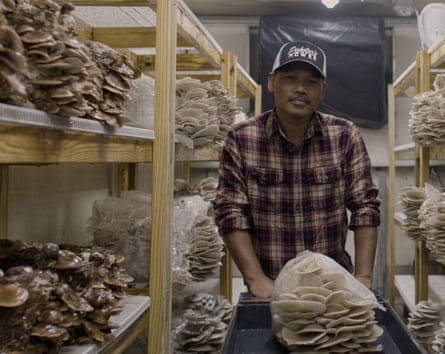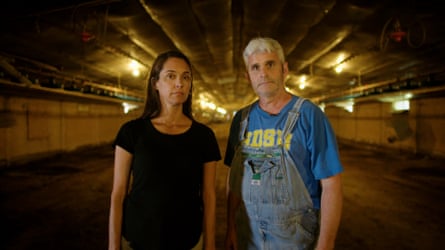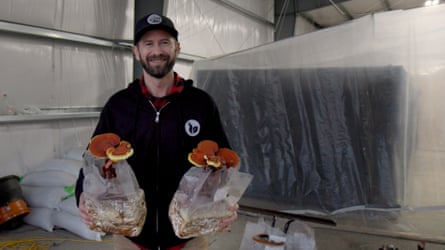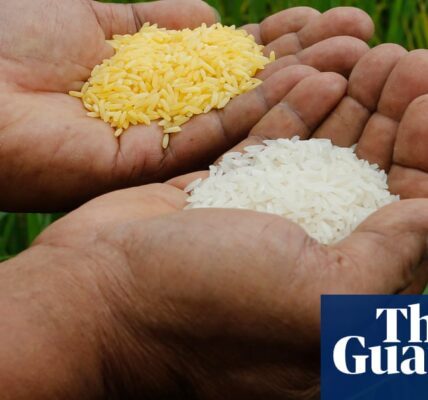Say goodbye to animal cruelty and hello to…mushrooms? These farmers are abandoning factory farming.
F
Tom Lim, an experienced poultry farmer, had been in the business for two decades. However, he faced hardship when his contract company let him go abruptly, leaving him with financial burden and no clear path forward. He described the moment as devastating and felt clueless about how to generate income to cover his debts.
Lim grew up in rural Cambodia, where his parents worked on rice fields with water buffalos. They also had a few chickens and grew their own vegetables near their house. This upbringing influenced Lim’s passion for farming, but his career as an adult took a very different turn. He now raises a total of 540,000 chickens annually in North Carolina for Pilgrim’s Pride, a major meat company in the United States that distributes chicken to big retailers like Walmart, Costco, and KFC.
As Lim continued working in large-scale poultry farming, he became more cognizant of its negative impact on the environment. He also noticed that many poultry farmers experience health problems from breathing in the ammonia-filled air in the chicken houses. This not only harms the ecosystem, but also puts human health at risk.

However, he was left with no other choice – each new season demanded a loan from the bank to cover the cost of upgrades required by Pilgrim’s Pride, without any assistance from them. “They said if we can’t meet their upgrade demands, we would lose the contract,” explained Lim. This created a never-ending cycle of debt, making it feel almost impossible to leave the business behind.
Lim’s situation is becoming more prevalent among American farmers. Around 25% of all farming ventures are in debt and family-owned farms are being acquired by big agribusinesses. Similar to Lim’s farm, many small farms are run under the direction of multinational agriculture companies that prioritize profits over the welfare of the farmers, their livestock, and the natural resources they rely on.
Lim is among the many farmers who are shifting from industrial animal farming to cultivating vegetables and mushrooms.
Lim’s contract expiring required him to seek employment outside of the farm, but it also presented new opportunities for how he could utilize his land. Together with his wife, Sokchea, they are transforming their previous chicken coops into greenhouses to cultivate vegetables. Additionally, they have repurposed an old refrigerated truck bed into a specialized mushroom-growing area.
“My ultimate goal is to sustain myself by cultivating vegetables on my land,” he expressed. “It’s a more natural and wholesome approach to food production. When working in the chicken coop, there are constant issues with ammonia, odors, and bugs. In comparison, entering the greenhouse provides a refreshing and nutritious atmosphere.”
M
Transitioning away from factory farming can be a challenging task, but the Lims received assistance from Transfarmation, an organization that offers farmers technical guidance and financial aid of $10,000 to $20,000 to facilitate the change.
Mercy for Animals, an animal rights advocacy group, created the project Transfarmation. The project was inspired by the experiences of its president, Leah Garces, and farmer Craig Watts. After 20 years of raising poultry for Perdue under contract, Watts became a whistleblower when he exposed the stark contrast between Perdue’s advertised image and the reality of their chicken farming conditions. Watts shared, “As a farmer, I felt the consumers deserved to know what was really going on.”

View the image in full-screen mode.
The director of Transfarmation, Tyler Whitley, acknowledged that in order to combat factory farming, their leaders recognized the necessity to provide farmers with alternative options.
According to Whitley, the farmers we partner with have informed us that the main obstacle is a lack of knowledge. Raising chickens is a vastly different experience from growing produce, and working for Tyson is not comparable to finding and maintaining your own clientele.
Transfarmation is partnering directly with farmers like Lim and Watts to transition their farms, as well as paying them a small stipend to collect data about their transition that will be made freely available online for other farmers who want to make a similar pivot. The organization’s farmer resources hub includes reports and YouTube webinars for learning about programs in each US state, sample plans for turning a shipping container into a mushroom-growing chamber, economic analysis of different crops, and guides on how to sell to restaurants and retailers and at farmers’ markets.
Tanner Faaborg was raised on a farm in the rural area of Iowa, where his parents worked for a commercial pig farming company. The farm had two barns that could hold up to 1,100 pigs each.
However, similar to the Lims, the Faaborgs eventually became trapped in a financial “treadmill”, where the business constantly required them to invest money in order to make upgrades or repairs, but the returns were never sufficient.
after newsletter promotion
In addition, according to Faaborg, performing such tasks under those circumstances has a negative impact on one’s physical well-being. It entails a significant amount of labor and poses a high risk of injury, worsened by poor air quality. Faaborg described the daily responsibilities of hauling deceased 250-pound pigs out of the barn.
After leaving for college and developing a passion for sustainability, Faaborg couldn’t envision himself returning to work on the farm without making some changes.
He revealed that he was unable to avoid the negative effects on the environment caused by the presence of two concentrated animal feeding operations and an open pit lagoon. Studies have demonstrated that residing near industrialized hog farms can decrease the lifespan of both farmers and nearby residents, due to pollution of the air and water.
He stated that it is not a mere coincidence that Iowa’s cancer rates are one of the highest in the nation and that their wells have consistently been polluted.
“I discussed it with my parents,” he explained, persuading them to install a solar panel on their property. More recently, he convinced them to leave the pig industry and switch to cultivating mushrooms. The farm now sells a variety of fresh, specialty mushrooms, along with mushroom-based items such as tinctures and salts.
A
At first glance, it may seem strange to see former livestock farmers, who are not necessarily against consuming meat, collaborating with an animal rights organization that advocates for veganism. However, despite their initial differences, both parties share enough common ground to work together, whether it be their concerns about the exploitation of animals, land, or people. “We’ve discovered that when we have discussions with farmers about their reasons for leaving and their grievances with the system, we actually agree on 90% of things,” stated Whitley.

Display the image in fullscreen mode.
“At this point, it is premature to deem any of these transitions on the farm as a definite triumph. The outcome for the Faaborgs, Watts, and the Lims will depend on whether they are able to secure a market that can sustain their new pursuits. However, they are all optimistic about the potential and are grateful for the support and companionship of others in similar situations.”
Faaborg recalls the feeling he had when they first installed solar panels on his parents’ farm – their neighbors were skeptical, and some even made fun of what seemed like a hare-brained idea. But over time, the solar array paid itself off, and Faaborg noticed that some of those same skeptics began installing solar equipment on their own land. He hopes that his family can once again influence their little corner of the agricultural landscape by shutting down their Cafos in favor of something gentler on themselves and on the land they farm.
He stated that the goal is to face this obstacle, achieve success, and demonstrate that change is achievable.
Source: theguardian.com


